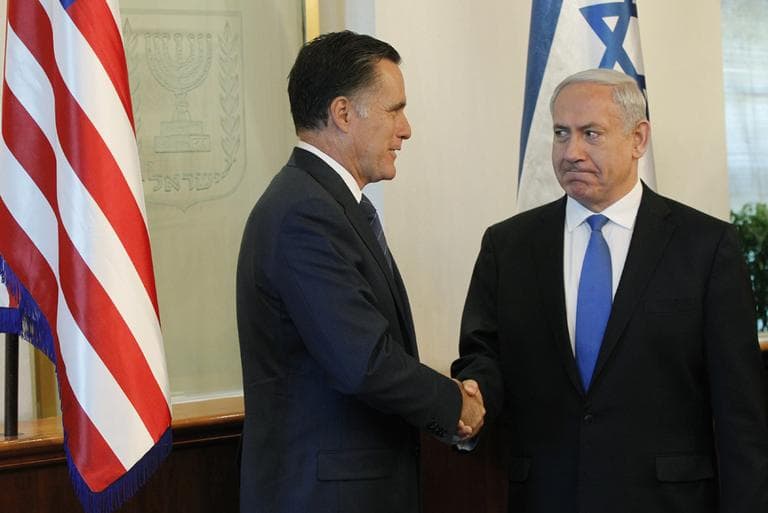Advertisement
Romney's World View
ResumeMitt Romney and the world. Romney as commander-in-chief. Foreign policy boss. What he’d do differently.

Mitt Romney did missionary work in France and famously stashed some serious money abroad, but beyond those, foreign affairs have not been his big life focus. Now, he’s getting close to the White House. And telling the country he would be more assertive, globally, than President Obama.
Talking tough on Iran, China, Russia. Railing against defense cuts. But what would he really bring? More Obama style? Bush-Cheney redux? His own way? War? Peace? Trade war?
This hour, On Point: From Tampa, Mitt Romney and the world.
-Tom Ashbrook
Guests
David Frum, a contributing editor at Newsweek and The Daily Beast and a CNN contributor. He was a speechwriter for George W. Bush.
Mitchell Reiss, a foreign policy adviser to Mitt Romney. A former diplomat, he's now the president of Washington College.
Gideon Rachman, chief foreign affairs correspondent at the Financial Times.
Rep. Adam Smith, a Democratic congressman from Washington. He is a ranking member on the House Armed Services Committee. You can find his article in Foreign Policy "The Romney-Cheney Doctrine" here.
Jack Beatty, On Point news analyst.
From Tom's Reading List
New York Times "But in the long stretch before the Republican convention in August, the battle for Mr. Romney’s mind on the key foreign policy questions that have defined the past few decades will have to be joined: When is a threat to America so urgent that the United States should intervene unilaterally? Is it worth the cost and casualties to rebuild broken societies? Should America feel it must always be in the lead — as Mr. Romney seems to argue — or let other powers play that role when their interests are more directly affected?"
Foreign Policy "As Romney considers possible running mates, it's worth remembering that he pointed to Dick Cheney as the "kind of person I'd like to have" working with him. Likewise, the policies that Romney has advocated — like indefinitely leaving our troops in Iraq and Afghanistan, for example — are continuations of the Bush-Cheney doctrine, version 2.0."
Foreign Policy "It is said this election will turn on domestic and economic issues, and barring any major international upheavals, this is probably right. But it is also true that our domestic and economic success is both a central cause and an enduring benefit of our global leadership — our ability and willingness to shape international events in line with our interests and values. We are now engaged in a great debate over whether America's core challenge is how to manage our own decline as a great power — or how to renew our capacity to carry on our proud tradition of world leadership. Ultimately, this is what's at stake in this election, and the stakes could not be higher."
This program aired on August 30, 2012.